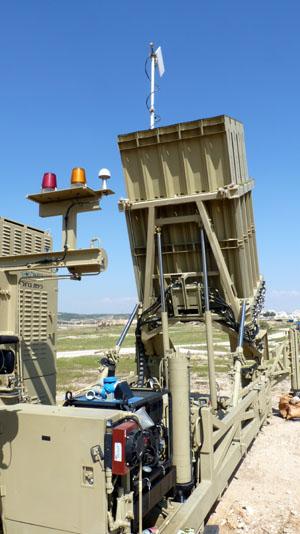Israel’s Iron Dome
Israel’s defense secretary praised the “Iron Dome” anti-missile system this week, but said it is not fully operational yet.
By Matthew Bell
Israel is speeding up the deployment of its high-tech anti-rocket system nicknamed the “Iron Dome.” The move comes in response to recent rocket attacks from Palestinian militants in the Gaza Strip. But Israeli officials are warning the public that the system is not yet fully operational.
Israel still has the most powerful military in the Middle East. But in recent years, the threat from rockets fired at the Israeli home front has proven to be tough to stop. During Israel’s wars with Hezbollah in 2006, and again with Palestinian militants in Gaza at the end of 2008, thousands of rockets and mortars rained down on Israeli territory.
That explains the motivation for Israel’s so-called Iron Dome system. Israeli Air Defense General, Doron Gavish said the system is unique. “There is no other system in the world which shoot missiles against rockets,” he said, standing next to the first anti-rocket battery deployed outside the southern city of Beer Sheva this week.
Gavish said the Iron Dome system is designed to track the launch of short and medium-range rocket or artillery shells with radar, and then blast them out of the air with interceptor missiles.
The general was asked if the system would be able to shoot down the kind of rockets that hit the area earlier this month. Gavish said the system is operational, but it’s still in the evaluation phase here outside Beer Sheva. He said the increased rocket fire from Gaza was the reason for accelerating the deployment of the system.
For these missile batteries to be effective, they will have to do something unprecedented: shoot down rockets in just 45 seconds. Israeli military spokesman Barak Raz said Russian-designed rockets launched from Gaza take less than a minute to react Beer Sheva.
“We’re talking about more or less 40 kilometers away from the Gaza Strip,” Raz said.
Speaking about the ‘Grad-type’ rockets shot by Palestinian militants into southern Israel, Raz said these weapons, “aren’t rockets that are manufactured in a basement with common dual-use supply. These are smuggled rockets, smuggled into the Gaza Strip via tunnels.”
Expensive system
The Iron Dome system is very high-tech and it is also very expensive. The interceptor missiles it fires are estimated to run between 35 and 50-thousand dollars each.
In 2010, the US Congress approved more than 200 million dollars in funding for the project. When asked about costs, General Gavish himself asked about the value of human life.
“The big question is, if you didn’t shoot [a rocket fired at Israel], what would it hit?” Gavish said. “Our job is to make sure that we will do everything that is needed in order to defend our population.”
Israeli officers have said the Iron Dome system is only one part of the country’s overall defensive strategy against rocket fire from Gaza. Civilians will continue to rely on warning sirens and bomb shelters, while the Israeli military will not shy away from using its attack capabilities.
In recent weeks, for example, Palestinian militants fired more than a hundred rockets and mortars at southern Israel. According to the United Nations, three Israeli civilians were injured.
During the same period, Israeli air strikes and shelling in Gaza killed 11 Palestinian militants, according to the Israeli military. Six Palestinian civilians were also killed. More than 50 people in Gaza were injured and about 40 of them were civilians (according to the United Nations).
The Israel Defense Forces chief of staff was quoted Thursday saying he lamented the loss of civilian life in Gaza. But he said Israel will not allow terror organizations to renew their efforts.
